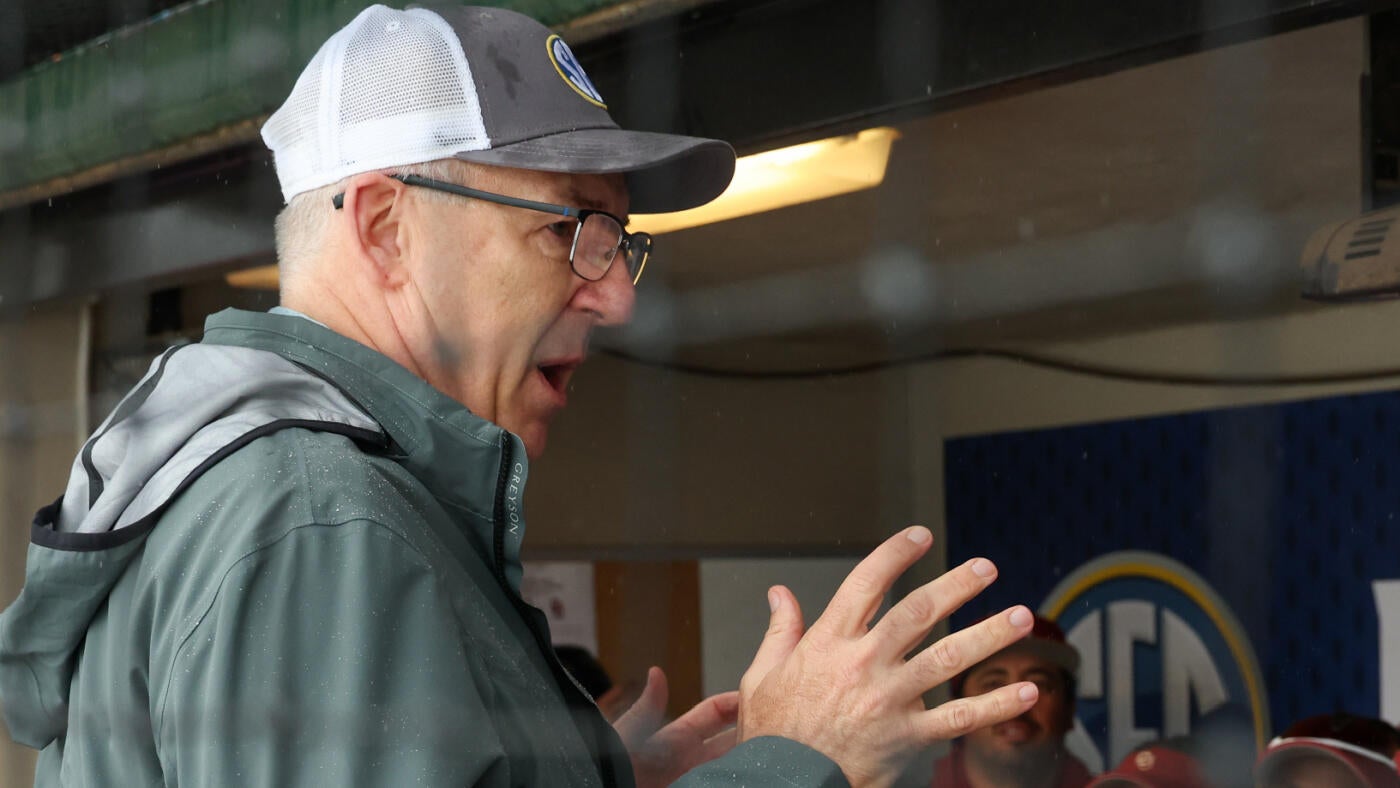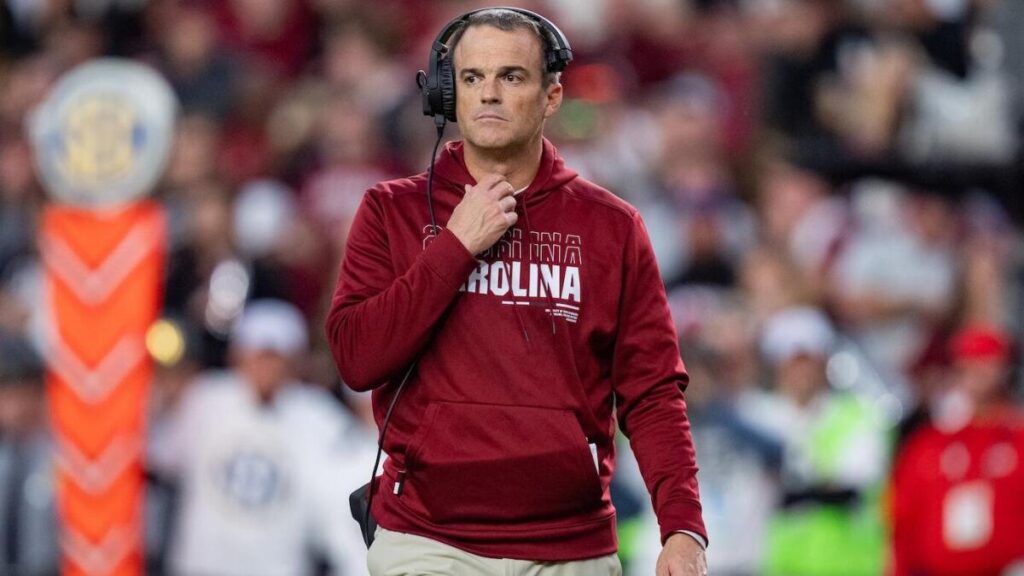Count South Carolina coach Shane Beamer among the supporters within the Southeastern Conference of football moving to nine conference games, albeit with a caveat.
Beamer, whose Gamecocks just missed the cut of making last year’s College Football Playoff, knows better than anyone how challenging the SEC schedule already is, let alone adding in a ninth conference game. Beamer supports the conference adding another game but has some questions about the benefit in doing so in a system he believes didn’t reward the toughest schedules last season when it left out South Carolina, Alabama and Ole Miss from the playoff field.
“Certainly I’m for it,” Beamer told CBS Sports this spring about moving to nine conference games. “But before we say we’re all in on nine, I think I speak for every coach in the league when we just say what exactly are the playoffs going to look like in future years.”
Greg Sankey kicks off SEC spring meetings with selective memory and spin that fails the reality test
Tom Fornelli
To Beamer’s point, it has become very clear that the SEC moving to nine conference games is tied to CFP format changes. Even before the CFP selection committee left out three SEC teams, the SEC and Big Ten had concerns about the committee’s ability to value the right things in picking the best field, according to multiple sources. CBS Sports reported extensively about those concerns back in December.
Ahead of the start of SEC spring meetings in Florida where the conference schedule debate is expected to be the hottest topic of the week, SEC commissioner Greg Sankey hit on those concerns again, decrying what the committee prioritized last season in selecting the 12-team field.
“It’s clear that not losing becomes more important than beating the University of Georgia, which two of our teams that were left out did,” Sankey said. “Nobody had that kind of quality win. You can’t just run down a College Football Playoff selection idea without thinking, well, if we play eight or nine games, that’s the depth of analysis we’re looking at.”
For years the SEC’s refusal to move to nine-conference games was tied to money. The additional money ESPN was offering simply wasn’t worth it to enough SEC schools to want to add another tough conference game (and possible loss) despite Sankey signaling that was the direction he wanted the conference to go. Those money concerns haven’t gone away for some schools – though ESPN’s offer has improved over the years – but an expanded playoff with four or more guaranteed spots for the SEC makes it an easier sell.
But even those that are on board with the move still have questions about its implementation. Beamer, for instance, wants to know if challenging non-conference scheduling will be taken into account. South Carolina is one of four SEC schools (Georgia, Kentucky and Florida the others) that play an annual in-state non-conference rivalry game in addition to the SEC slate. South Carolina has the toughest task of the four playing Clemson each year, though the Gamecocks have won two of the last three games.
Future of the College Football Playoff hinges on touchy subject among power conferences: Automatic qualifiers
Brandon Marcello

“I realize nowadays, with revenue sharing coming, I get it…every athletic department in America is trying to find more and more ways to generate revenue and if you have a ninth conference game that makes us more attractive to the TV networks, that’s more revenue,” Beamer said. “And for the fans, it’s great that you’re going to have nine conference games each year.
“The only issue I have is I just want it to be balanced for everyone in the conference because everyone does not play a non-conference rival like we do when we have Clemson every year. So in my mind we’re playing nine Power Four games as it is plus we play Virginia Tech this year so we got 10. Next year we got Miami and Clemson so we’re already playing 10 Power Four games. If we play a ninth conference game, now we have 11. That’s great if we’re playing nine conference games but I would hope that everybody in our league is playing the same number of Power Four opponents as we are each year because, if not, then it is a competitive disadvantage to our program.”
There have been rumblings about what could happen to rivalry games like South Carolina-Clemson, Georgia-Georgia Tech, Florida-Florida State and Kentucky-Louisville if the SEC moves to nine conference games. Is it worth preserving long-standing rivalries when any potential loss could be the difference between making the playoff or not, or even making a bowl game or not? It’s essentially a moot point because of how linked conference games now are to playoff expansion, but it would be an even harder sell for schools like South Carolina after missing the playoff despite wins over Clemson and Texas A&M.
As Beamer put it: “Are we playing nine games for more money or are we playing nine games for more money and to enhance our ability to get in the playoff by playing a more challenging schedule?”
College Football Playoff straight-seeding model adopted for 2025: What it means for conference champions
Brad Crawford
There have also been discussions, according to multiple sources, around a Big Ten-SEC scheduling alliance that could create a 10th Power Four game for programs. It’s partly why some schools either get out of scheduling deals with non-conference Power Four opponents or at least slow down scheduling past 2026 when a new playoff format could debut. Nebraska recently canceled its series with Tennessee, and Matt Rhule explained it wasn’t worth playing games like that after already playing nine Big Ten conference games.
Sankey said Monday that he’s heard from athletic directors wondering whether they should even play some of the marquee non-conference games they have scheduled. His advice, to this point, has been: “Don’t walk away.”
Beamer doesn’t need the hard sell. The South Carolina coach is very, very clear about one thing: He wants the Clemson game every year.
“The magnitude of this rivalry is unlike anywhere that I’ve ever been of all the places that I’ve coached and it’s not just football, it’s all sports,” he said. “The baseball series against Clemson every year is a big freaking deal and whatever we play Clemson in, they feel the same way about us. I don’t want it going away because I know how important it is to the people of this state, on both sides, and it’s great exposure for the state of South Carolina. I thought last year was awesome that we played Clemson and arguably the biggest Carolina-Clemson game ever – both teams were ranked, had ramifications, we were on the national stage and that’s great publicity for both programs, both schools, the whole state.”
TheBigSpur has the most experienced experts and insiders covering the Gamecocks on the ground in South Carolina. The market leader in coverage, TBS, produces team news, recruiting and transfer portal scoop, analysis, opinions and more. It’s the largest site covering the Gamecocks with the most active community of South Carolina fans. Be the first to know news before it happens by signing up for a VIP membership and experience what TheBigSpur has been providing to fans for close to 20 years.
Read the full article here


